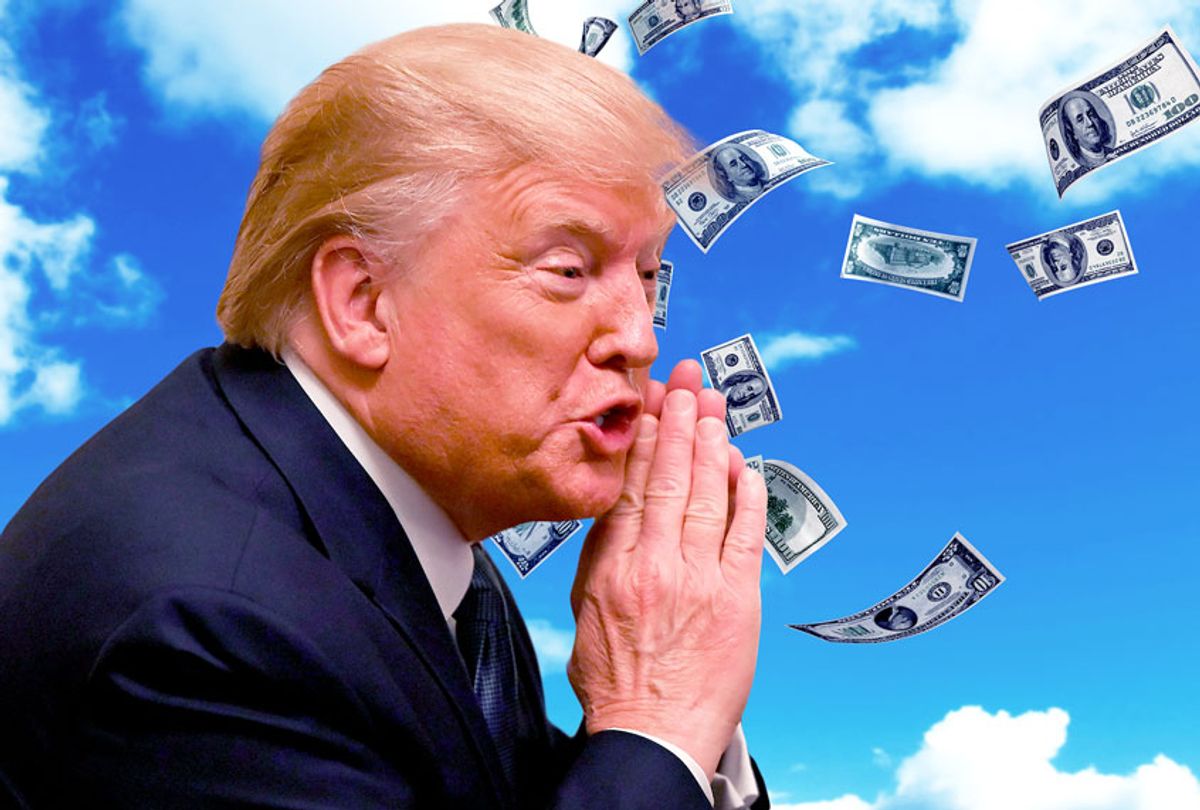President Trump is rewarding senators that support him on impeachment with bundles of campaign cash, drawing accusations of political bribery.
Trump, who has raised more than $300 million this year, is urging his immense fundraising network to contribute to Republicans who have signed onto a resolution condemning the House impeachment inquiry, while snubbing Republicans like Sen. Susan Collins of Maine, who refused to support it, Politico reports.
On Wednesday, Trump’s campaign issued a fundraising appeal to supporters to donate funds that would be equally distributed among Sens. Cory Gardner, R-Colo., Joni Ernst, R-Iowa, and Thom Tillis, R-N.C., all of whom are supporting the resolution and face tough re-election battles in 2020.
“If we don’t post strong fundraising numbers,” the campaign warned, “we won't be able to defend the President from this baseless Impeachment WITCH HUNT.”
Trump is also expected to host a fundraiser for Sen. David Perdue, R-Ga., at an event where guests are being asked to donate up to $100,000, according to Politico, and will speak at an event held by the Senate Leadership Conference, a super PAC aligned with Senate Majority Leader Mitch McConnell.
All of those senators co-sponsored the resolution to condemn the impeachment inquiry, while Collins, who refused to back the resolution and has criticized his rhetoric on the probe, was snubbed.
The campaign also snubbed Sen. Martha McSally, R-Ariz., a vulnerable senator who did co-sponsor the resolution but angered Republican officials with her reluctance to exclusively rely on the new Trump-backed fundraising tool WinRed, which Republicans launched to counter the success of of the Democrats’ ActBlue fundraising platform.
Both Collins and McSally were outraised by Democrats running to unseat them in the last quarter before the snub. Republican National Committee spokesman Mike Reed told Politico that Trump’s fundraising appeal raised “six figures” in just one day.
"Our supporters stand totally behind President Trump and are eager to support down-ballot candidates who do the same," he said. Party officials told the outlet that the Trump campaign would continue to raise money for senators who were not included on the first email.
Scott Reed, a political strategist for the U.S. Chamber of Commerce, told Politico that Trump “has the ability to turn on the money spigot like no one else.”
Republicans have been largely united in their defense of Trump. Just three senators, Collins, Lisa Murkowski of Alaska and Mitt Romney of Utah, have not signed on to the resolution.
"I'm going to keep an open mind and I'm going to wait to make comments on any evidence," Romney told CNBC. “I want to see the facts. In my view, it’s time for me to stay silent on impeachment until the process is complete.”
Trump lashed out at Romney on Twitter, prompting McConnell to intervene and persuade Trump to stop attacking senators who would soon decide his fate in an impeachment trial, Politico reported.
Though presidents often raise money for down-ballot races, Trump appearing to tie support on impeachment to fundraising drew allegations of “bribery.”
Richard Painter, who served as White House ethics chief under President George W. Bush, called Trump’s scheme “criminal.”
“This is a bribe,” he tweeted. “Any other American who offered cash to the jury before a trial would go to prison for felony bribery. But he can get away with it?”
“The senators can raise their own campaign cash,” he added. “Any senator who accepts cash from [Trump] before the impeachment trial is guilty of accepting a bribe and should go to the slammer.”



Shares